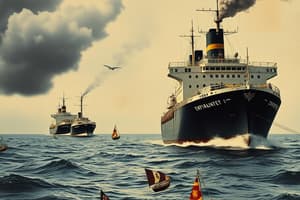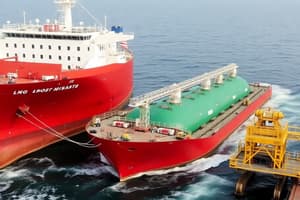Podcast
Questions and Answers
What is the permitted distance for discharging food wastes from ships that have been processed through a comminuter according to Annex V?
What is the permitted distance for discharging food wastes from ships that have been processed through a comminuter according to Annex V?
3 nautical miles
What condition allows the discharge of cleaning agents or additives from cargo hold wash water?
What condition allows the discharge of cleaning agents or additives from cargo hold wash water?
If they are not harmful to the marine environment
What is the maximum distance at which untreated food wastes can be discharged from a ship?
What is the maximum distance at which untreated food wastes can be discharged from a ship?
12 nautical miles
Under what condition can food wastes be discharged from fixed or floating platforms according to Regulation 5?
Under what condition can food wastes be discharged from fixed or floating platforms according to Regulation 5?
What action must be taken when garbage is mixed with prohibited substances?
What action must be taken when garbage is mixed with prohibited substances?
What is the primary purpose of placards required by Regulation 10?
What is the primary purpose of placards required by Regulation 10?
What precaution must be taken to exempt accidental loss of fishing gear from discharge requirements?
What precaution must be taken to exempt accidental loss of fishing gear from discharge requirements?
According to the amendments to MARPOL Annex V adopted at MEPC (70), when do the new regulations enter into force?
According to the amendments to MARPOL Annex V adopted at MEPC (70), when do the new regulations enter into force?
What year did Annex VI of MARPOL 73/78 enter into force?
What year did Annex VI of MARPOL 73/78 enter into force?
What is the maximum allowable sulphur content of fuel oil used on board ships in Emission Control Areas?
What is the maximum allowable sulphur content of fuel oil used on board ships in Emission Control Areas?
What term describes the phenomenon of gases trapping infrared radiation leading to global warming?
What term describes the phenomenon of gases trapping infrared radiation leading to global warming?
What is the primary purpose of the International Air Pollution Prevention Certificate (IAPP)?
What is the primary purpose of the International Air Pollution Prevention Certificate (IAPP)?
What is the main objective of the revised MARPOL Annex VI regarding air emissions?
What is the main objective of the revised MARPOL Annex VI regarding air emissions?
When did the global sulphur limit for fuel oil combustion decrease to 0.50% m/m according to MARPOL Annex VI?
When did the global sulphur limit for fuel oil combustion decrease to 0.50% m/m according to MARPOL Annex VI?
What document needs to be retained for three years after the delivery of fuel on board?
What document needs to be retained for three years after the delivery of fuel on board?
What is the main purpose of an Emission Control Area (ECA)?
What is the main purpose of an Emission Control Area (ECA)?
What is the definition of emissions in the context of Annex VI of MARPOL 73/78?
What is the definition of emissions in the context of Annex VI of MARPOL 73/78?
What does the NOx technical code define and limit?
What does the NOx technical code define and limit?
What is the primary method for reducing nitrogen oxides (NOx) emissions from marine diesel engines?
What is the primary method for reducing nitrogen oxides (NOx) emissions from marine diesel engines?
What does the abbreviation 'NOx' stand for in the context of maritime emissions?
What does the abbreviation 'NOx' stand for in the context of maritime emissions?
What is the primary purpose of Regulation 17 regarding reception facilities?
What is the primary purpose of Regulation 17 regarding reception facilities?
What is one of the main carriers of potentially invasive aquatic species?
What is one of the main carriers of potentially invasive aquatic species?
What is the primary purpose of the Ballast Water Management (BWM) Certificate?
What is the primary purpose of the Ballast Water Management (BWM) Certificate?
How many different species of marine microbes, plants, and animals are estimated to be transferred worldwide every day via ballast water?
How many different species of marine microbes, plants, and animals are estimated to be transferred worldwide every day via ballast water?
Flashcards
Emission Control Area (ECA)
Emission Control Area (ECA)
An area where stricter limits on sulfur content in fuel oil are enforced.
Greenhouse effect
Greenhouse effect
The process by which certain gases in the atmosphere trap heat from the sun, causing the Earth's temperature to rise.
NOx
NOx
A gas released during combustion, formed by a reaction between nitrogen and oxygen.
Ozone Depleting Substances (ODS)
Ozone Depleting Substances (ODS)
Signup and view all the flashcards
Bunker delivery note
Bunker delivery note
Signup and view all the flashcards
Scrubbing system
Scrubbing system
Signup and view all the flashcards
NOx Technical Code
NOx Technical Code
Signup and view all the flashcards
Main objective of MARPOL Annex VI (revised)
Main objective of MARPOL Annex VI (revised)
Signup and view all the flashcards
Regulation 2 under Annex V
Regulation 2 under Annex V
Signup and view all the flashcards
Permitted distance for discharging comminuted food waste
Permitted distance for discharging comminuted food waste
Signup and view all the flashcards
Permitted distance for discharging untreated food waste
Permitted distance for discharging untreated food waste
Signup and view all the flashcards
Discharge of cleaning agents in cargo hold wash water
Discharge of cleaning agents in cargo hold wash water
Signup and view all the flashcards
Mixed garbage discharge requirements
Mixed garbage discharge requirements
Signup and view all the flashcards
Food waste discharge from platforms
Food waste discharge from platforms
Signup and view all the flashcards
Food waste discharge distance in special areas
Food waste discharge distance in special areas
Signup and view all the flashcards
Exemption from discharge requirements
Exemption from discharge requirements
Signup and view all the flashcards
What is the IAPP?
What is the IAPP?
Signup and view all the flashcards
When did the global sulfur limit decrease?
When did the global sulfur limit decrease?
Signup and view all the flashcards
What is an ECA?
What is an ECA?
Signup and view all the flashcards
What is SCR?
What is SCR?
Signup and view all the flashcards
What are Exhaust Gas Scrubbers (EGS)?
What are Exhaust Gas Scrubbers (EGS)?
Signup and view all the flashcards
What is a major carrier of invasive species?
What is a major carrier of invasive species?
Signup and view all the flashcards
When did the BWM Convention enter into force?
When did the BWM Convention enter into force?
Signup and view all the flashcards
Which ships are subject to the BWM Convention?
Which ships are subject to the BWM Convention?
Signup and view all the flashcards
Study Notes
Regulation 2 Under Annex V
- Application: Focuses on permitted distances for discharging food waste.
- Comminuted/Ground Food Waste: Discharged within 3 nautical miles of the nearest land.
- Untreated Food Waste: Discharged within 12 nautical miles of the nearest land.
Cleaning Agents and Additives
- Cargo Hold Wash Water: Discharged only if not harmful to the marine environment.
Garbage Disposal
- Mixed Garbage: Applying more stringent requirements if mixed with prohibited substances.
- Food Waste from Floating/Fixed Platforms: Discharged only when more than 12 nautical miles from the nearest land.
- Food Waste from Special Areas: Discharged within 12 nautical miles of the nearest land.
Exemption Scenarios
- Accidental Loss of Garbage: A ship is exempt under Regulation 7.
Placards
- Purpose: To notify crew and passengers of discharge requirements.
- Size Requirement: Ships 12 meters or longer overall are required to have placards.
Garbage Management Plan
- Size Requirement: Ships over 400 gross tonnage are required to carry a Garbage Management Plan.
MARPOL Annex VI Amendments
- Effective Date: Amendments are effective March 1, 2018.
- Fishing Gear Loss: Precautions must be taken to prevent loss and exempt the accidental loss of fishing gear from discharge requirements.
- Placard Languages: Placards must be in the crew's working language, in addition to English, French, or Spanish.
- Cargo Residue Discharge: Discharge is permitted within 12 nautical miles of the nearest land
MARPOL Annex VI
- Ozone Depleting Substances: Annex VI prohibits deliberate emissions of ozone-depleting substances (ODS). ODS substances include chlorofluorocarbons (CFCs) and halons. Specifically, this annex does not prohibit the use of ODS in situations where fire extinction is required.
- Sulfur Oxide and Nitrogen Oxide Emissions: Annex VI sets limits on sulfur oxide and nitrogen oxide emissions from ship exhaust and prohibits deliberate emissions of ozone-depleting substances.
- Emission Control Areas (ECAs): An area under Annex VI of MARPOL 73/78 specifies limits on sulfur in fuel oil used on board ships. Fuel oil sulfur limits should not exceed 0.10% m/m.
- Emission Control Areas (ECAs): Sulphur content of fuel oil must not exceed 0.1% m/m.
Greenhouse Effect
- Definition: The process where certain atmospheric gases trap infrared radiation, warming the planet.
- Emission Control Areas (ECAs): Limits on substances applicable to emission control areas effective from Jan 1, 2015.
Greenhouse Gas
- Nitrogen Oxide (NO): Is not greenhouse gas.
Acid Rain
- Formation: Nitrogen oxides and sulfur oxides combine with water vapor in the atmosphere.
- Global Sulphur Limit: Combustion decreased to 0.50% m/m on January 1, 2020.
NOx Technical Code
- Definition: Defines and sets limits on nitrogen oxide emissions from diesel engines.
Halon
- Definition: An ozone-depleting substance used for fire extinguishers.
Bunker Delivery Notes
- Retention Period: Bunker delivery notes should be kept on board the ship for 3 years.
- Sulphur Content: Maximum allowable sulfur content for fuel oil outside Emission Control Areas is 0.5%.
Revised MARPOL Annex VI
- Abatement Technologies: The objective is to achieve equivalent measures for reducing air emissions.
- Greenhouse Gases: Nitrogen oxide is not a greenhouse gas.
- Bunker Delivery Notes: Record details of fuel delivered and used onboard.
- NOx Technical Code: Objective of reducing nitrogen oxide emissions.
- Fuel Availability: To ensure the availability of compliant fuel.
- Reception Facilities: Ensure proper disposal of ozone-depleting substances.
- Abatement Technologies: Equivalent measures to reduce air emissions.
- Air Pollution Prevention Certificate: Certifies compliance with air pollution regulations.
Ballast Water Management (BWM) Convention
- Invasive Species: Ballast water is a major carrier of invasive aquatic species.
- Ships Covered: Ships over 400 GT are covered.
- Excluded Vessels: War ships are exempt from the Convention.
- Ballast Water Exchange: To prevent species transfers. Methods include: Flow through, Dilution, and Sequential Methods.
- BWM Certificates: Purpose is to demonstrate compliance with future regulations.
- Non-Compliance: Subject to penalties and fines.
- Species Transfer Estimates: Worldwide transfers range from 7,000-10,000 species per day.
Studying That Suits You
Use AI to generate personalized quizzes and flashcards to suit your learning preferences.




